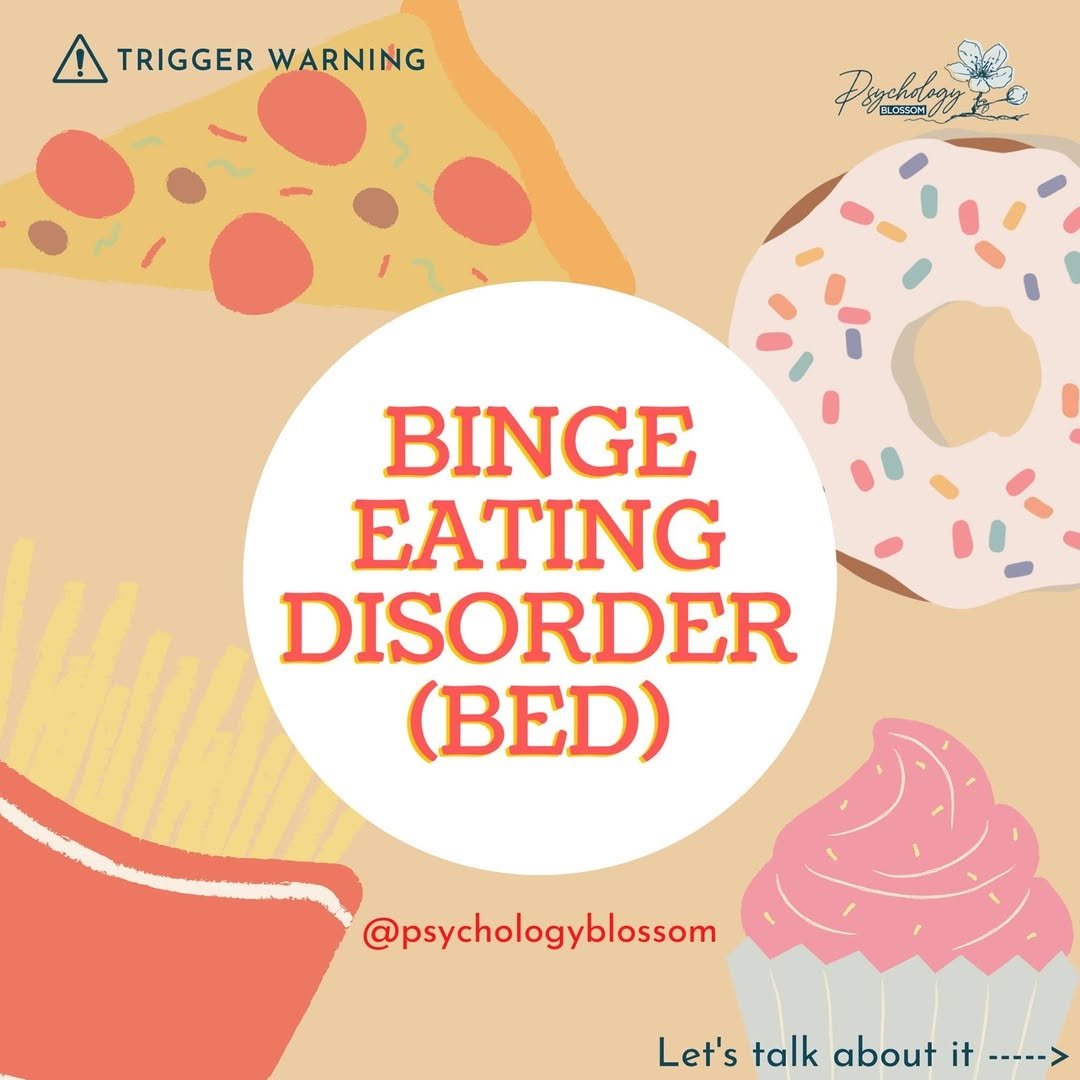Binge Eating Disorder (BED): Understanding the Silent Struggle
When we think of Eating Disorders (ED), disorders such as Anorexia and Bulimia and characteristics such as starvation or being skinny are likely to pop up in our minds. We often neglect disorders such as Binge Eating Disorder (BED) which are more common than we think. This disorder is marked by recurrent episodes of binge eating followed by intense feelings of guilt and shame. Unlike other eating disorders such as Bulimia Nervosa, BED does not include any compensatory behaviours after binging, such as purging.
What is Binge Eating?
Binge Eating Disorder is characterized by recurrent episodes where individuals consume unusually large amounts of food in a short period of time. The key distinction from occasional overeating is the compulsive nature of these episodes and the feelings of loss of control and distress associated with them.
Some common signs and symptoms of BED include:
- Eating every few hours (e.g. 2 hours) and having more than a single serving at a time
- No control in eating behaviours (e.g. being unable to stop eating)
- Eating beyond feeling full (e.g. nauseousness, faint)
- Feeling depressed or guilty after eating
- Feeling embarrassed to eat in front of others
Risk Factors for BED
There is no single cause for BED, but multiple risk factors can contribute:
- Family history of BED or any other eating disorders
- Dieting may increase the likelihood of eating disorders
- Presence of other psychological issues (e.g. depression and anxiety)
- Social/cultural factors: bullying, sexual assault, poor diet as a child
Identifying Signs of BED in Others
Recognizing BED in loved ones can be difficult because shame and secrecy often surround the disorder. Some red flags include:
- Disappearance of a large amount of food
- Person is concerned with weight loss and general body image
- Person has no fixed eating schedule
- Person has low self-esteem
- Attempts of dieting or new dieting fads
- Person usually eats alone or is uncomfortable eating in front of others
What Can You Do if You or Someone You Know Has BED?
BED may lead to severe health consequences (e.g. obesity, heart disease), hence it is important to seek professional help to treat the eating disorder. If you suspect a loved one may be struggling with BED or any other eating disorder, try to engage in an open and honest dialogue with them, and encourage them to approach a psychologist or doctor.
At home, it is also important to build a healthy sense of self-esteem for yourself and your family members. This can help enhance self-confidence and reduce the chance of body image issues. Following adequate meal plans with sufficient nutrients can also help develop healthy eating patterns in the household. Encouraging balanced meals rather than strict dieting can reduce the risk of relapse or worsening symptoms.
Binge Eating Therapy
✽ Types of Psychotherapy
- Cognitive Behavioral Therapy (CBT): CBT can provide individuals with coping methods to help deal with negative thoughts of body image. It can also introduce skills to help avoid overeating by replacing destructive thought patterns with healthier ones.
- Interpersonal Psychotherapy: Interpersonal psychotherapy can be useful if binge eating episodes are triggered by relationship issues. This form of therapy focuses on improving interpersonal relationships, thus avoiding the triggers of binge eating episodes and hence overeating.
- Dialectical Behaviour Therapy (DBT): DBT focuses on four components: emotional regulation, interpersonal effectiveness, distress tolerance, and mindfulness. It makes use of the concept of dialectical abstinence to instill the idea that relapses or slip-ups during the recovery journey are normal and inevitable. This mindset helps individuals stay on track and not fall back into old habits, even after a relapse.
✽ Medications
Anti-depressants and Topiramate, or Topamax, have been used to help reduce binge eating episodes. Medications may help regulate mood, reduce compulsions, and improve overall treatment outcomes when used in conjunction with therapy.
Moving Towards Recovery
Recovery from BED is a gradual process. It involves addressing not only eating patterns but also the emotional struggles that fuel disordered eating. Family support, social understanding, and structured professional treatment create the foundation for lasting recovery. While relapse may occur, the journey toward healing is not invalidated by setbacks — each step forward builds resilience and creates hope for a balanced, healthier future.
We recommend This Video to those who wants to learn more about Binge Eating Disorder.
